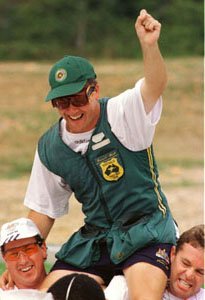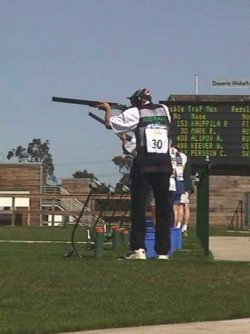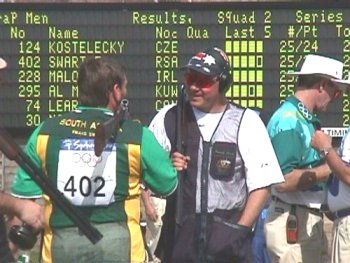INTERVIEW WITH RUSSELL MARK
Russell Mark was one of the most dominant competitors in world-level Trap shooting in the 1990s and early 2000s. Gold medalist at the Olympic games in Atlanta in Double Trap, he and teammate Michael Diamond firmly placed Australia at the top of their sport. Russell was in Atlanta in July 2000, where he kindly agreed to this interview. As an afternote, Russell missed by the narrowest of margins in defending his Olympic Gold at home in Sydney in 2000, taking home the Silver medal after a shootoff after the Double Trap Final.
When did you start shooting?
That’s an easy one. Back in 1978. I’ve been in the Australian International team since 1986, every year since then. So it took me a little while to get in there, but I’m thirty six now and basically I started when I was about fourteen.
What was your home club when you started?
I was from Ballarat in Victoria. I was born and bred there. I did a lot of competition back then, but in the American disciplines more so than the International. The International disciplines aren’t as popular in Australia as American Skeet or American Trap. Everybody starts at the lower levels and I guess if you want to compete at the Olympic Games you can only do that by shooting the International disciplines.
So you first made the Australian team.
My first International Team was the World Championships in 1986, and this will be my fourth Olympics in Sydney.
Australia has made big inroads in probably the last six or seven years. Why do you think that is?
When I first won our first World Championship in 1994 I think that opened the doors for a lot of other clay target shooters. With Michael Diamond and myself winning at the Olympics in 1996 it gave the sport some profile for the first time. We’d won a lot of events at world cup level prior to that, but unfortunately in Australia, as probably it is here in the United States, until you win an Olympic gold medal the rest of the world doesn’t want to know about you. It’s only Olympic gold medals, silvers won’t be enough, it will get the press and the publicity and the positive publicity to get your sport some profile. We were lucky enough to get a lot of government support from winning those two gold medals as well. The government has pumped a lot of money into ensuring this team does well again in September.
Not only shotgun, but pistol and rifle have gained a lot as a flow-on from your success.
There’s no doubt the rifle and pistol team will, being under the same umbrella as far as sports funding is concerned. The rifle and pistol team is largely young and this Olympics may be too soon to expect a lot from them. I’d say by Athens in 2004 there’ll be a few Australian rifle and pistol shooters start to really show the legacy of the money that’s been spent now.
When you’re preparing for a big event, what sort of hours do you put in weekly?
Between now, being the start of July, until the Olympic Games in September, I’d probably only practice three to four times a week, five hundred to six hundred shots a week. I find I’ve got to do a lot of physical work in shotgun shooting. The fitter and stronger I am the better I perform. I do a lot of running, a lot of bike riding and a lot of weight work now. Fitness and strength training is just as important as time out there on the shooting range. Too much training I find leads to too many mistakes, you get careless with your training. So I like to stay a little keener, I don’t think I’m ever going to learn anything, or I’m not any more, about technique. I’ve got my technique down, it’s not worth changing it. I just find the hours that I find more productive are in the cross training, in the physical side of the sport.
How about the mental side? Do you have any tricks for handling big competition?
The biggest trick I find is to treat it like it’s a small one. And honestly, at the Olympic Games here in Atlanta I went out in the Final just thinking I was back at my home range in Victoria having another practice session. You trick your brain, because if you can do that, then shooting becomes very easy. It’s not a hard sport. I find clay target shooting isn’t a sport where you need a lot of technical advantages because basically all you do is shoot in front of the target and you’re going to hit it. If you can keep it as simple as that I just find it becomes very easy. But mentally you can make it much harder that it is. Unfortunately that word Olympic in front of any event tends to scare a lot of the competition away. That’s what makes it so big. Once every four years.
 It’s interesting that you say that, because it is very much a concentration sport, where you’ve got to be right on the ball at that moment, when the target comes out.
It’s interesting that you say that, because it is very much a concentration sport, where you’ve got to be right on the ball at that moment, when the target comes out.
Yes, well in my event you’ve got one point two seconds to hit two clay targets flying away from you at a hundred miles an hour. If you’re thinking about the wrong thing, being what the glory will be of winning an Olympic gold medal or how scared you are because you’re competing in the Olympics, you’re going to miss. If you can relax and just keep it like the thousands and thousands of shots you’ve fired prior to the Games, then it becomes very easy. It is just a matter of mind over matter, it’s as simple as that. You can complicate it as much as you want,(and I don’t care what type of shooting it is, pistol, rifle or shotgun), basically we’ve all done so many hours of training that there’s nothing different on the day of the Olympic competition that’s different to your training. Except, to be honest, your heart rate goes up about two hundred percent for the first two or three minutes of the competition. Once you get over that and you’re happy to control that then it becomes very easy.
Is there anything different that you do in trap that sets you apart from an average trap shooter?
No, I don’t think I am any different to be honest. I don’t think I’ve been blessed by God with any special talents. I never feel that, I feel very humble any time when I go to any major world event and win a gold medal. I think the reality is with the experience I’ve had, being fourteen or fifteen years in the team, that’s the advantage I’ve got. The disadvantage I’ve got now is that I’m giving ten years head start to a lot of the kids I’m shooting against. Here at the US Trials I watched a seventeen year old boy shot a score that would be good enough to win the Olympic Games. I’m more than twice his age now, and that’s sometimes hard for me to accept that you can go out and be that old and give that much advantage to somebody.
I guess it’s different in the Double Trap event.
It is. Double Trap is a younger person’s game. There’s no doubt about it. Skeet you can get away with so much more because your reflexes don’t have to be anywhere near as good. There are still some shots in Skeet where you have to be fast, but there’s so many more that are giveaway targets. You don’t have any in double trap. It’s all reflex. We’re just finding that when I won the World Cup in Sydney I was ten years older than the next oldest person in the Final. I was thirty six, the next eldest was twenty six. Now that’s a sure sign of the times. The days are virtually over where people are shooting both trap and double trap. There’ll only be a handful of people at the Olympic Games now that are doing more than one event. It’s becoming a very specialized event and undoubtedly in Athens, if I continue on there, I’ll be competing in only one event. I would be unrealistic to think I could continue in two.
How long do you think you’ve got at this level of the sport?
Athens will be it. I’ve been offered a contract with Beretta through to 2005. That is my last year also when I’ll be of any benefit to them. I’ve been with that company for twelve years, that’ll be seventeen years with the same company. And financially they’ve made my life a lot easier, so for them to offer me another four years on my contract before this Olympic Games I guess it probably ensures I’ll stick around until 2004 at least.
That was going to be my next question, what gun are you using?
I use a Beretta SO5. They’ve also given me one of their new model guns, it’s just hit the world market, called the Model DT10. I’ll probably use that after the Olympic Games I think. It’s a little bit too late to change now. I’m sponsored by an American company also with ammunition, Winchester. They’ve been big supporters of mine for quite some time. And of course, since winning the Olympic Games I’ve been able to pick up different types of corporate sponsorship in Australia, being Telstra (phone company) and Ansett (airline). But it’s all back to front in Australia, those companies only ever come on board after you win an Olympic gold medal, never before. I think it would be pretty much like that here in the United States. I don’t know how hard corporate sponsorship is outside the shooting sports, but I wouldn’t think it would be easy.
Do you guys have a choice of the shells you shoot at a major competition or are they supplied?
competition or are they supplied?
Winchester, for all of the events on the world scene, send my ammunition to where I’m going. I wouldn’t use anything other than Winchester shells, obviously because I think they’re the best to start with. But it’s what you get used to. Changing ammunition at a major competition is generally fraught with danger.
Do you have a preference for a load?
Seven and a half shot I use, both barrels in double trap. A lot of people might use a little bit lighter shot, but I’ve experimented with everything. The only thing I do differently in double trap is I use a very open choke in the bottom barrel, for the first shot. One that spreads very quickly. Other than that I use everything else the same. As I said I experimented with them all and virtually came back to where I started.
Is the Australian Winchester you’re shooting?
Yes, but it’s interesting that here in the United States the US Shooting Team has copied the load that Australia made and they are duplicating it exactly here for their team. So Australia and the United States are now using exactly the same ammunition. I used to think we had an advantage over them there but now we haven’t.
For shooters starting out in the sport what advice would you give them? Do you think they should start in American Trap?
I think here in the States and in Australia we’re very lucky to have an easier discipline of clay target shooting for them to try first. I think you need to be competent in that before you make the step to International level because technically it’s just a little bit harder with the faster speed of the targets in International. By having the easier discipline there as a stepping stone it’s a big advantage we have over the European countries which don’t offer that at all. So therefore we tend to get better juniors coming through the ranks, ones that are more competent and ones who know how to do a lot of winning because in the junior ranks of American Trap and Skeet they can do a lot of winning, and then progress to the junior levels of International Trap and it’s not so foreign to them then.
What sort of advice would you give to beginners equipment wise?
You don’t need a twenty two thousand dollar shotgun like I use, that’s for sure. I went my the first Olympics with an eight hundred dollar shotgun. But I just see so many trap shooters trying to shoot or to start with stocks that are too low for them, stocks that were set up for sporting clays or field shooting, or even skeet shooting. They need to get a higher comb for trap shooting, and unfortunately the stock they need is purely specialized for just shooting rising clay targets. But if you’re going to learn the discipline you’re going to need to at least learn the right basic fundamentals and ensure that’s got to be the way to start for anybody. At least get the basics of it correct first, and then experiment all you like from there because it is a sport of experimentation.
Because fit is everything with a shotgun.
Exactly. My gun won’t fit you and yours won’t fit me. Basically you need to be well above the rib of the gun. A lot of guys I see starting out don’t realize it.
